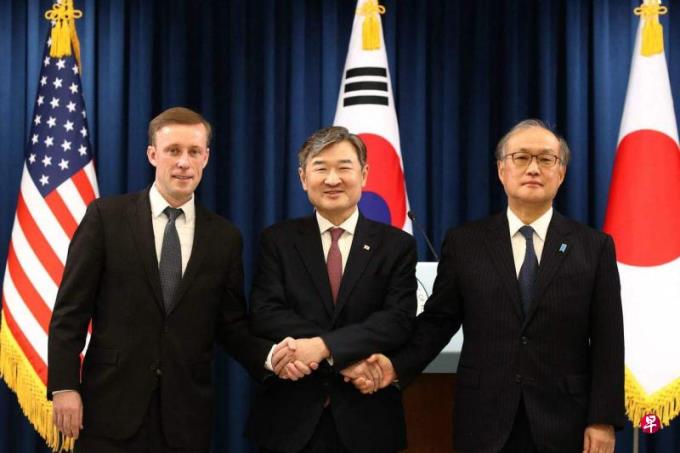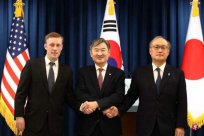
(Seoul Composite Electric) The United States, South Korea and Japan reiterate the peace and stability of the Taiwan Strait and the South China Sea together. At the same time, a new three -party initiative has also been launched to cope with North Korea's threat in the network space, including the abuse of cryptocurrenciesR & D with space arms.
U.S. President's National Security Affairs Consultant Saiden, South Korea ’s National Security Office Chief Zhao Taiyong, and the Director of the Japan National Security Security Akigo Qiu Ye Gang Yami met in Seoul, South Korea on Saturday (December 9) to follow the leaders of the Three Kingdoms at the David Camp in August this year.Discussion at the summit.
Sarawin's joint press conference after the meeting said: "We will continue to maintain the peace and stability of the Taiwan Strait, and the freedom of navigation in the East China Sea and the South China Sea."
The United States and its Western allies have added naval ships to the "freedom of navigation" in the Taiwan Strait and the South China Sea, which emphasized that these two places are international waterways, and this moves Beijing.
South Korean President Yin Xirui pointed out in April that Taiwan ’s tension was caused by China’ s “trying to change the status quo with force”.These remarks have triggered a relative of diplomatic competition between China and South Korea.
Yin Xirui has recently actively strengthened the relationship between Seoul and long -term ally, Huafu, to fight against the increasing threat from the nuclear North Korea.In addition, he also sought to resolve the differences between Japan, another intimate allies in the United States.
The United States, Japan and South Korea held a historic summit at the David Camp in the United States, stating that the "new chapter" of three -party close security cooperation will be launched.In Beijing, a statement announced by the summit at the time protested, because the United States, Japan and South Korea criticized China ’s“ provocative operation ”in the South China Sea in a statement.
Shatin told reporters that the United States, Japan, and South Korea are promoting new initiatives in response to the problems caused by North Korean threats and online crimes, virtual currency money laundering and reckless space and ballistic missiles.
He added that the coordination efforts of the three allies will also threaten potential economic coordination. They have completed the key minerals and supply chain warning systems that can be finalized in David Camp.
Akihagang pointed out that North Korea's "illegal network activities" have become the latest challenges. He said that these activities were the "source of funds" for North Korea to develop nuclear missiles.
On the same day, the North Korean Central News Agency reported on the same day that Pyongyang was determined to launch more spy satellites in the near future, and said that space development was part of its self -defense rights.
It is reported that these satellites will be based on Pyongyang's first military reconnaissance satellite "Wanli Mirror-1" launched in November.This anonymous comment said: "If necessary, these satellites will perfectly implement guidance and lead us to work in a super strong blow."
The United States, South Korea, Australia, and Japan have condemned North Korea for launching spy satellites.Shalvin recently insisted that North Korea's satellite launch involved ballistic missile technology that violated UN resolutions.
The national security advisers of the Three Kingdoms also exchanged views on the issue of Ukraine and the Middle East.Shatin said that they discussed the increasingly strengthened military cooperation between Russia and North Korea. Both parties believe that North Korea is providing weapons for Russia for Ukraine War.North Korea denied any weapon to Moscow.




